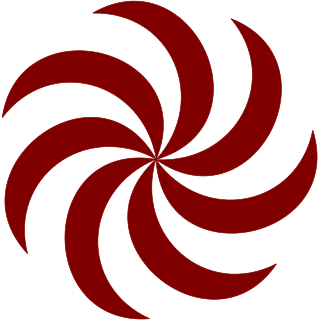Top Qs
Timeline
Chat
Perspective
Borjgali
Georgian symbol of the Sun From Wikipedia, the free encyclopedia
Remove ads
Borjgali (Georgian: ბორჯღალი; also Borjgala or Borjgalo; Borçgali in Laz) is a Georgian symbol of the Sun and eternity.[1][2] The Borjgali is often represented with seven rotating wings over the tree of life which can be used to create various shapes and variations and is considered one of the main symbols of Georgian culture.[3]

Etymology
The term Borjgali translates to "the flow of time" from Megrelian borj "time" and gal "pass" or "flow". The word is believed to derive from the Megrelian term ბარჩხალი (barchkhali), which means "brilliance" or "glitter." Other scholars believe its origin is from Old Georgian ბურჯი (burji) "time" and "ღალ" (ghal) "holy fruit" or "harvest," together meaning "holy fruit sprouting from time."[4]
Usage
This pre-Christian symbol was widely used in both western (Colchis) and eastern (Iberia) Georgia, appearing in Georgian architecture’s Dedabodzi (“mother-pillar”), a central sacred pillar comparable to a king post, as part of a Darbazi in the Kura–Araxes culture, where it served as a holy symbol.[5] During the medieval period, this symbol was incorporated into Christian symbolism. It is depicted on well-known cathedrals such as Svetitskhoveli and Bagrati Cathedral.[6] Nowadays, the symbol is used on Georgian IDs and passports, as well as on the national currency and by the Georgian Rugby Union. Georgian rugby team players are called ბორჯღალოსნები (borjgalosnebi), which means “men bearing the Borjgali.” It was also used on the naval ensign of Georgia during the late 1990s and early 2000s.[7]
Remove ads
Gallery
- Colchian representation of the Borjgali
- Borjgali on the Cathedral of Oshki
- Borjgali on a Georgian coin
- Borjgali on 100 Georgian lari
- Georgian rugby player with Borjgali on his shorts and shirt
- Borjgali on Georgian Airways
- Borjgali in Fereydunshahr
- Borgali on the former Georgian naval ensign, used during the late 1990s and early 2000s
See also
References
Further reading
Wikiwand - on
Seamless Wikipedia browsing. On steroids.
Remove ads








